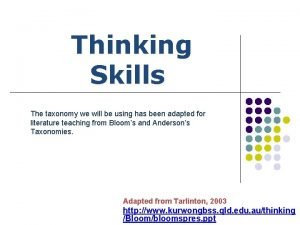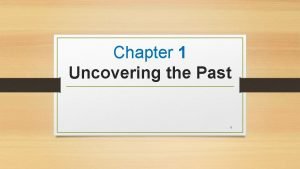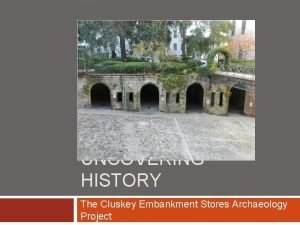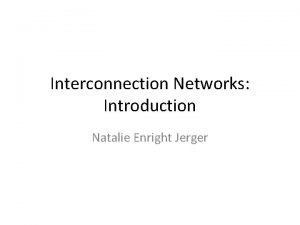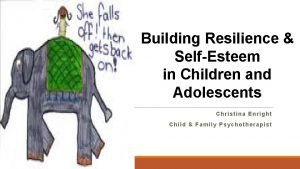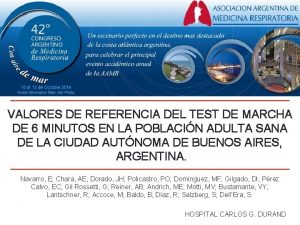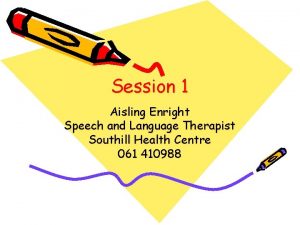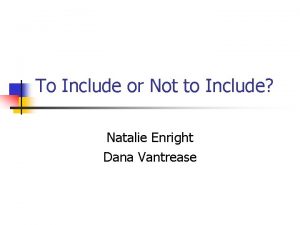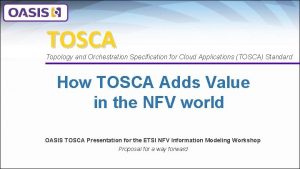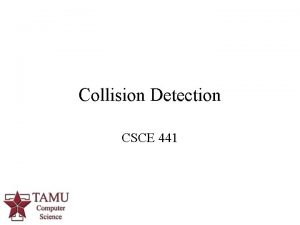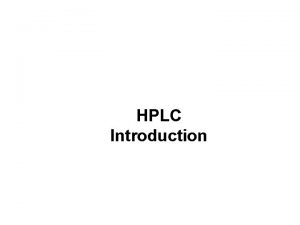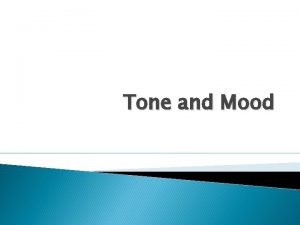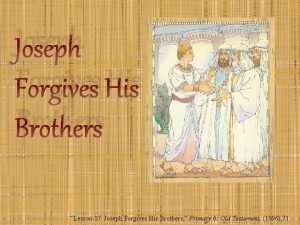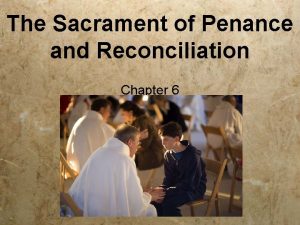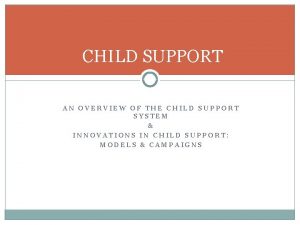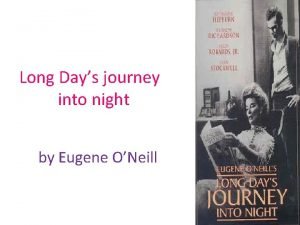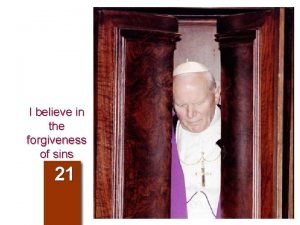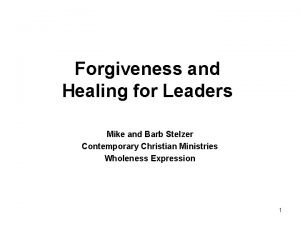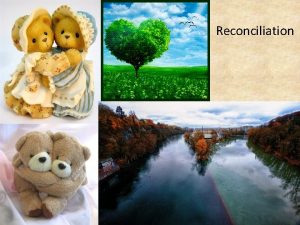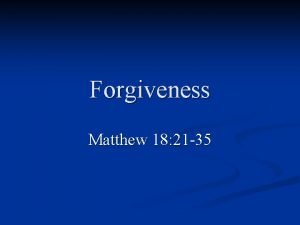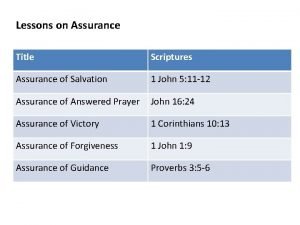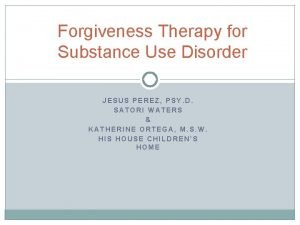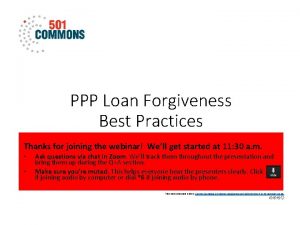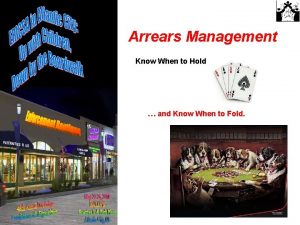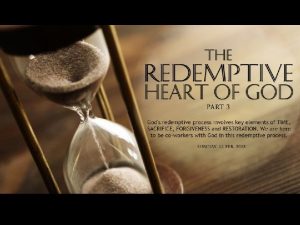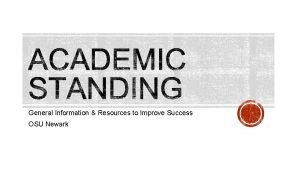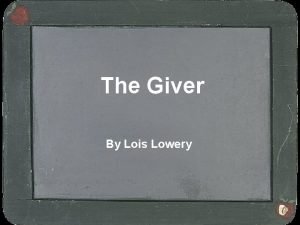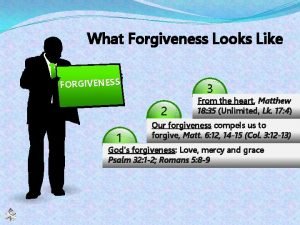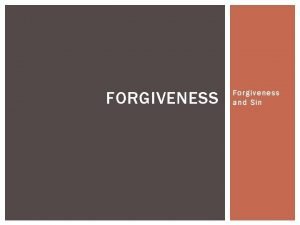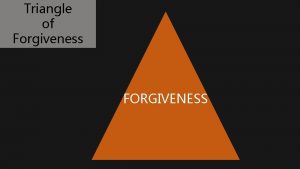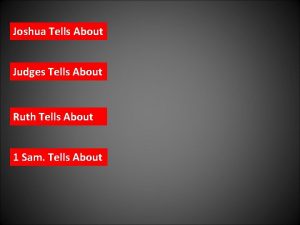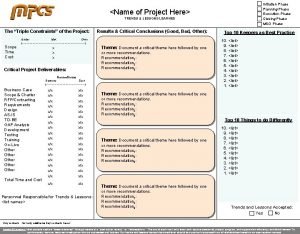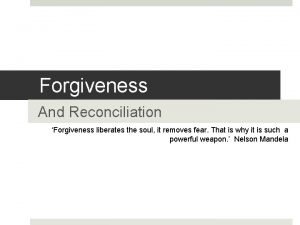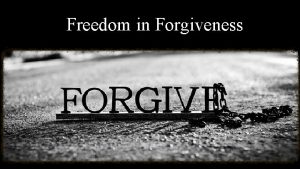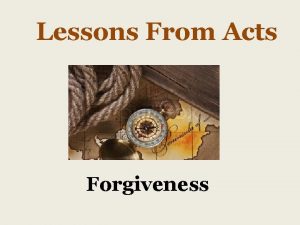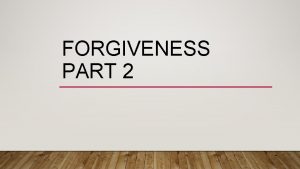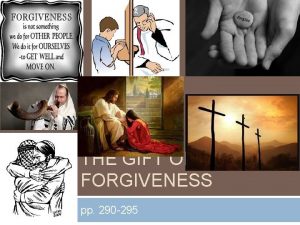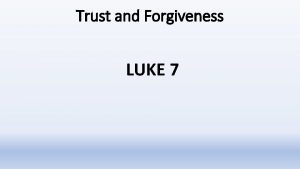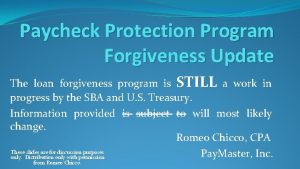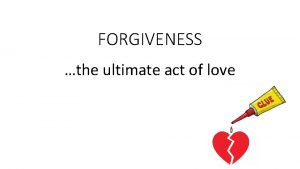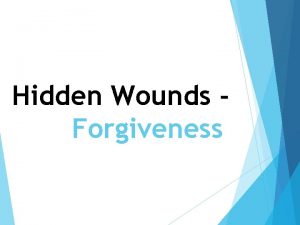Forgiveness Phase 1 Uncovering Dr Enright tells us

















































- Slides: 49

Forgiveness Phase 1 Uncovering

Dr. Enright tells us: “People, upon rationally determining that they have been unfairly treated, forgive when they willfully abandon resentment and related responses (to which they have a right), and endeavor to respond to the wrongdoer based on the moral principle of beneficence, which may include compassion, unconditional worth, generosity, and moral love (to which the wrongdoer, by nature of the hurtful act or acts, has no right). ”

The ABCs of Forgiveness In genuine forgiveness we have: Positive affect (feelings) toward the offender Positive behavior toward the offender Positive cognitions (thoughts) toward the offender

Significant improvement in 12 weeks (Baskin & Enright, 2004). Can be done in group format. Readiness to forgive. Some are some not… What is masking your hurts? Usually anger, but can be other emotions.

Layers of Wounds… 1. 2. 3. 4. 5. 6. 7. 8. Defenses and Issues Involved Confrontation of Anger Admittance of Shame Awareness of Depleted Emotional Energy Awareness of Cognitive Rehearsal Comparing Self and Offender Facing Permanent Change Having an Altered “Just World” View

Take time to do this well… Homework identified in red as Journal:

1. Defenses and Issues Involved… Issues Involved: Journal: i) When did this happen and how often did it happen? ii) Who was unfair? iii) Why do you say that he or she was unfair?

Defenses: Journal: i) Insights into how the injury occurred. ii) What defenses are preventing the client from rationally examining what happened? iii) How subsequent injury have compromised his or her life?

2. Confrontation of Anger… Journal: i) Are anger or other emotions masking the pain? For eg, anger, road rage ii) Are you taking your emotions out on others?

3. Admittance of Shame… Public scrutiny and natural embarrassment. Sexual abuse Getting fired Journal: i) Is pride in the way of admitting shame? ii) Do you feel safe?

4. Awareness of Depleted Emotional Energy… Drained and tired a lot…sleep difficulties Are you tired of being tired? Journal: Suppose you have TEN points of energy each day to help you do all you must do. How many points of energy are used in “stewing” about the person you are considering forgiving?

5. Awareness of Cognitive Rehearsal Revisit over and over again Driving, holiday… Putting the person “out” but they are very much “in” Journal: How often you think of this person in one week.

6. Comparing Self and Offender Think the offender is more fortunate. Journal: i) Make comparisons between you and the one you wish to forgive. ii) State one of his or her advantages and one of your disadvantages. iii) Challenge to see if this is really true?

7. Facing Permanent Change Admit life has changed (maybe not at all) Journal: i) Make comparisons between you and the one you wish to forgive. ii) State one of his or her advantages and one of your disadvantages. iii) Challenge to see if this is really true.

8. Having an Altered “Just World” View Following a traumatic event, they have distorted views such as: Can’t trust anyone. All will leave me. Must take care of self first. Work hard not “relax”. No one will love me. Can’t fit in (Schemas). Pessimistic. “Danger out there”. “Me” first from now on. When we truly forgive these become weaker. Journal: What has changed in your world view before and after?

Homework: Journal thoughts for each layer of wound… 1. 2. 3. 4. 5. 6. 7. 8. Defenses and Issues Involved Confrontation of Anger Admittance of Shame Awareness of Depleted Emotional Energy Awareness of Cognitive Rehearsal Comparing Self and Offender Facing Permanent Change Having an Altered “Just World” View

Forgiveness Phase 2 Decision

Dr. Enright tells us: “People, upon rationally determining that they have been unfairly treated, forgive when they willfully abandon resentment and related responses (to which they have a right), and endeavor to respond to the wrongdoer based on the moral principle of beneficence, which may include compassion, unconditional worth, generosity, and moral love (to which the wrongdoer, by nature of the hurtful act or acts, has no right). ”

The ABCs of Forgiveness In genuine forgiveness we have: Positive affect (feelings) toward the offender Positive behavior toward the offender Positive cognitions (thoughts) toward the offender

Phase 1 - Layers of Wounds… 1. 2. 3. 4. 5. 6. 7. 8. Defenses and Issues Involved Confrontation of Anger Admittance of Shame Awareness of Depleted Emotional Energy Awareness of Cognitive Rehearsal Comparing Self and Offender Facing Permanent Change Having an Altered “Just World” View

Common questions if done in a group… When group meets to share about homework, should we disclose identities? What if someone says there is no one to forgive? (All of us gets hurt. . . Perhaps they are in denial? Perhaps they really don’t have anyone…) What if someone vents a lot of resentments and his issues start to dominate the group? (Time limit but deal separately) What if a person doesn’t want to participate? (Encourage to observe but not be absent) What if they have shared their issues before and do not want to share them again? (Give this model a chance) Do we give feedback in the first session? (No, just listen to each other’s issues. Later, yes) Respect confidentiality

Phase 2 – Decision Insights from Uncovering Phase should provide motivator – energy depletion, comparisons, wrong world view, dangerous to mental and physical health. Hopefully this will lead to a “change of heart”. There is a better way than avoidance and/or holding resentments.

Benefits of Forgiveness… 1. 2. 3. 4. 5. 6. 7. 8. Moral virtue. Eases emotional pain and restores health. Beneficial to the one forgiven, if he/ she sees the error of his/her ways. Makes possible for a restored relationship if both sees their errors. Preventing from displacing anger onto someone else. As they practice over and over again, they become forgiving persons. Leave a beautiful legacy behind. Shows others how to live.

Forgiveness is NOT… Condoning the actions of the offender Excusing the actions of the offender Forgetting the actions of the offender Reconciling the actions of the offender Not a “doormat” or being “weak” Forgiveness and Justice go hand in hand within reasonable limits.

In this phase we are mostly concerned about abandoning resentments and its complications. Revenge in all forms – not returning calls, not giving any well wishes, speaking ill, being critical, not being warm, deliberate avoidance. Forgive cognitive (intellectual level) before we reach affective forgiveness (emotional level). Can decide even if you are angry or have other kinds of feelings, but just don’t act on the resentment (Many are in this category).

Most difficult phase but also most important. Group encouragement makes a difference. Journal: i) How did you deal with forgiveness previously? ii) On a scale of 1 to 10 rate the effectiveness of your previous method? <forget, avoid, denial, dishonesty> with 1 being very ineffective, but 10 being very effective. iii) How have you done harm to them? How can you reverse this trend? (Silence, critical, not cooperative, cold shoulder, confrontational, gossip, slander…)

Forgiveness Phase 3 Work phase

Why must this be a process? Because forgiveness is hard…

Dr. Enright tells us: “People, upon rationally determining that they have been unfairly treated, forgive when they willfully abandon resentment and related responses (to which they have a right), and endeavor to respond to the wrongdoer based on the moral principle of beneficence, which may include compassion, unconditional worth, generosity, and moral love (to which the wrongdoer, by nature of the hurtful act or acts, has no right). ”

Phase 2 “Decision” Moral virtue. Eases emotional pain and restores health. Beneficial to the one forgiven, if they see the error of their ways. Makes possible for a restored relationship. Preventing from displacing anger onto someone else. As they practice over and over again, they become forgiving persons.

The Work Phase When a person progresses to this phase, he or she is entering into the deep process of forgiveness. The work ahead is difficult, but it can pay dividends for emotional relief and possibly even re-established wounded relationships!

Reframing To reframe is to RETHINK a situation or to see it with a fresh perspective Before anyone can have positive feelings (affects) towards an offender, one has to develop a deeper understanding of one’s thoughts (cognitive insight) A series of questions are given to challenge our view of the offender as a human being and not as evil incarnate

Reframing What was it like for the offender as he or she was growing up? (this is NOT to condone what happened) What was it like for the offender at the time of the offense you are considering? Can we try to see him or her as a member of the human community, someone who is special, unique and irreplaceable? (Note: NOT talking about reconciliation here)

1. Reframing Journal: What was life like for the offender when growing up? What was life like for the offender at the time of the offense? Why do you say that he or she was unfair? What has your relationship with the person been like OUTSIDE of the offense itself? What is the person like when you see him/her as a human being? What is the person like when you see him/her as God’s creation? How has your view changed as a result of answering the above questions?

2. Develop Empathy and Compassion Journal: What are your emotions towards the offender as you experience it NOW while journaling? Are there any positive emotions, even if they slip by quickly? Has the anger been lessening?

2. Develop Empathy & Compassion (cont’d) Daily reflection on the following statements three times EACH: (Name) has been emotionally wounded, and I too have been emotionally wounded. ” (Name) has had love withdrawn from him/her. ” I have compassion toward (name). ” I do not condone or excuse what (name) has done. He/she is more than what he (she) did to me. ”

3. Accept the Pain Journal: How difficult is it to accept the pain (of what has already happened)? Rate it on a scale of 1 (very difficult) to 10 (very easy) Are there any role models for us? How are they helpful to us? Why is it important for us to learn from them?

4. Giving a Moral Gift What kind of gift is appropriate to give the offender? Suggestions include: writing a note, help with chore, prepare a nice dinner etc Journal: Evaluate your ideas one by one; do you feel comfortable with the final idea?

Forgiveness Phase 4 Discovery & Release from Emotional Prison

1. Discover the Meaning of Suffering “The heart of healing was in finding a rational meaning, a narrative that made sense to the one suffering. ” Viktor Frankl (1959)

Suggestions for Cultivating Meaning of Suffering: Does your worldview include a way out of suffering? If yes, explore what that is. If there is no way out of suffering, explore whether that worldview is exaggerated. What does your worldview say about doing good in the face of suffering?

Suggestions for Cultivating Meaning of Suffering: Is suffering something that benefits others? If so, find out who those others are. How can you find relief for self and others while suffering, according to your worldview? Is suffering a reality of this world, or is it caused primarily by your own perceptions?

2. Discover Your Need for Forgiveness Think of a time when you wronged others. Was forgiveness extended to you? How did that feel? What were the consequences of receiving forgiveness? Examining the forgiveness we receive from others (family, friends, your faith) helps put our forgiving of others into context.

3. Discover that You Are Not Alone Sometimes the pains of injustice can make us feel isolated and alone. As you forgive, you may see that others are there to help. Important to get support early from your small group or close friends. Who is someone who can be your confidant to discuss the issues with?

4. Discover the Purpose of Your Life As you master forgiveness, whom can you help with what you have learned? Think of giving back to community when your life is beginning to become more settled. Having new goals related to what was learned from the process of forgiveness is helpful.

5. Discover the Freedom of Forgiveness is transformational. As you go through the process of forgiveness, you will discover your sense of well-being developing. As resentments diminish and a sense of beneficence grows, you may develop: lower levels of anxiety or depression higher levels of hope higher levels of self-esteem

Homework: Reflect through the questions under discovering meaning of suffering and journal down your thoughts/answers. Get support E. g. small group, therapist or mentor Group Help. Do this exercise as a group for at least a month (if needed).

Reference: Material from Dr. Robert Enright's books Forgiveness Is a Choice, The Forgiving Life, and Forgiveness Therapy (with Dr. Fitzgibbons).

May You Be Blessed on Your Forgiveness Journey
 Dr robert enright
Dr robert enright Uncovering motives hots
Uncovering motives hots Uncovering the past worksheet answer key
Uncovering the past worksheet answer key Uncovering history first
Uncovering history first Natalie enright jerger
Natalie enright jerger Christina enright
Christina enright Natalie enright jerger
Natalie enright jerger Test de marcha valores normales
Test de marcha valores normales Aisling enright
Aisling enright Natalie enright jerger
Natalie enright jerger Natalie enright jerger
Natalie enright jerger Natalie enright jerger
Natalie enright jerger Torus topology network
Torus topology network Tacker openstack
Tacker openstack Mobile phase and stationary phase
Mobile phase and stationary phase Which detector used in hplc
Which detector used in hplc Chromatography definition
Chromatography definition Phase to phase voltage
Phase to phase voltage Normal phase vs reverse phase chromatography
Normal phase vs reverse phase chromatography Broad phase vs narrow phase
Broad phase vs narrow phase Hplc reverse phase vs normal phase
Hplc reverse phase vs normal phase Normal phase vs reverse phase chromatography
Normal phase vs reverse phase chromatography Phase to phase voltage
Phase to phase voltage How to explain the tone of a story
How to explain the tone of a story Joseph forgiveness lesson
Joseph forgiveness lesson Chapter 6 sin and forgiveness answers
Chapter 6 sin and forgiveness answers National board amazonweise yorktimes
National board amazonweise yorktimes Kansas child support arrears forgiveness
Kansas child support arrears forgiveness Long day's journey into night
Long day's journey into night I believe in the forgiveness of sins
I believe in the forgiveness of sins Scriptures on forgiveness
Scriptures on forgiveness Forgiveness vs reconciliation
Forgiveness vs reconciliation Ted talk on forgiveness
Ted talk on forgiveness Questions about forgiveness
Questions about forgiveness Assurance of salvation outline
Assurance of salvation outline Fgcu grade forgiveness
Fgcu grade forgiveness Great gatsby revision
Great gatsby revision Phases of forgiveness
Phases of forgiveness Ppp loan forgiveness
Ppp loan forgiveness Arrears management program
Arrears management program God's forgiveness
God's forgiveness What is forgive
What is forgive Colossians 3:12-13 esv
Colossians 3:12-13 esv Genesis chapter 45
Genesis chapter 45 Osu!
Osu! Why does the giver ask jonas for forgiveness
Why does the giver ask jonas for forgiveness Fau academic probation
Fau academic probation What does matthew 6:14-15 mean
What does matthew 6:14-15 mean What forgiveness looks like
What forgiveness looks like Principles of forgiveness of sin
Principles of forgiveness of sin

